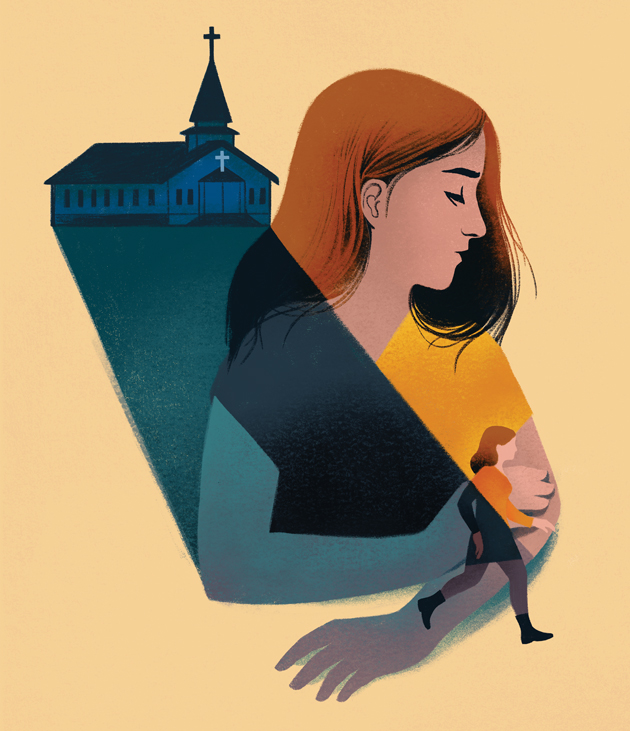Welcome to DU!
The truly grassroots left-of-center political community where regular people, not algorithms, drive the discussions and set the standards.
Join the community:
Create a free account
Support DU (and get rid of ads!):
Become a Star Member
Latest Breaking News
Editorials & Other Articles
General Discussion
The DU Lounge
All Forums
Issue Forums
Culture Forums
Alliance Forums
Region Forums
Support Forums
Help & Search
Women's Rights & Issues
Related: About this forumEvangelical Purity Culture Taught Me to Rationalize My Sexual Assault Then I discovered #ChurchToo.
Evangelical Purity Culture Taught Me to Rationalize My Sexual Assault
Then I discovered #ChurchToo.
 ?w=630
?w=630
It didn’t hit me right away what had happened. It was an upsetting moment, but it was, in many ways, an upsetting relationship. After losing someone close to me, I was questioning my place in the world and what had previously been a steadfast devotion to Christian beliefs. He was battling his own demons. One February afternoon, we were arguing in his college-boy room, with dirty clothes strewn across the beige carpet and a big computer rig perched atop a beat-up desk, exhaling heat. I was tired of the on-again, off-again, and just a few months stood between me and graduation and dreams of a faraway move and a fresh start. I turned to leave, and he blurted out, “I love you.” It was the first time he’d said it. We got caught up, one thing led to another, and then both our clothes were on the floor. I stopped him at one point, looking into his eyes: “Don’t.”
Shock ripped through me when he did anyway.
In the years since, I’ve replayed that afternoon in my head even when I would prefer to leave it behind and let time fade it into something I can no longer conjure. I knew it was significant. I registered that something had been taken from me, but I couldn’t identify it—maybe I didn’t want to. I realized my own past was deeply intertwined with this evangelical reckoning. That finally changed last November, when I started tracking #ChurchToo on Twitter for an article about the burgeoning movement to address an epidemic of sexual abuse in evangelical churches. Many Christian women, particularly white evangelicals, are taught from an early age the importance of remaining “pure”—for God, their future husbands, and their families. To do otherwise would be to invite paralyzing shame and a sense of failure. For evangelicals, all sin is bad, but sexual sin carries a special weight, as though it’s a harder thing for God to forgive. Only in recent decades did that preoccupation become a moral panic, brought on by the sexual revolution, the AIDS epidemic, and an uptick in certain sexually transmitted infections.
That’s when “purity culture” began to congeal into a lucrative industry. Encouraged by evangelicals, the administration of President Ronald Reagan funneled millions of tax dollars into school abstinence programs. Faith-based organizations developed purity curricula and devised ways to reach teens and young adults outside the church’s grasp. Groups like Silver Ring Thing and True Love Waits launched an empire of rallies, concerts, and events—complete with merch—to attract impressionable adolescents, many of whom went home wearing silver “purity rings.” But something unexpected happened this past year. Even as large swaths of evangelicals were starting to question their religious instruction on sex and gender, the #MeToo movement threw the wheels off and #ChurchToo was born: Powerful, male evangelical leaders began to fall as women who had historically recoiled from the “feminist” label began writing about assaults they had suffered within their church communities, and how the abusers had masked their guilt under a shroud of piety. Reading those stories and talking to their authors brought into focus what had lingered around the edges of my memory, and I realized my own past was deeply intertwined with this evangelical reckoning.
. . . . .
I cannot count on the culture that enabled my assault to change in a way that satisfies me, but maybe if I scream loud enough I can use my pain to protect others. Making matters worse, Finch points out, are the passivity and submission that church doctrine ingrains deeply in evangelical women. The culture teaches us not to speak up and say, “I like that,” or “I don’t like that”—or to confront a man who crosses a serious line. This dynamic is finally starting to shift. Women who have long been told to keep quiet are shouting for reform and creating an open online community under the #ChurchToo hashtag. Evangelicals and exvangelicals—those who no longer identify with their religious pasts—are organizing to expose the ways purity culture creates a toxic environment that enables abuse and assault. Even the culture’s strongest advocates are having doubts: In an upcoming documentary, I Survived I Kissed Dating Goodbye, Joshua Harris grapples with the realization that his ideas are hurting people. In the same film, prominent evangelical Dannah Gresh—whose philosophy about modesty begot an empire of speaking engagements, books, and “truth or bare” quizzes—says she is reconsidering her use of the word “pure” and henceforth will only deploy it to describe a state of mind, as opposed to a physical state of being that, once tarnished, can never be restored. While neither revelation is particularly profound or even close to progressive, both would have been unthinkable a few years ago.
. . . .
https://www.motherjones.com/politics/2018/08/evangelical-purity-culture-taught-me-to-rationalize-my-sexual-assault/
InfoView thread info, including edit history
TrashPut this thread in your Trash Can (My DU » Trash Can)
BookmarkAdd this thread to your Bookmarks (My DU » Bookmarks)
0 replies, 1002 views
ShareGet links to this post and/or share on social media
AlertAlert this post for a rule violation
PowersThere are no powers you can use on this post
EditCannot edit other people's posts
ReplyReply to this post
EditCannot edit other people's posts
Rec (5)
ReplyReply to this post